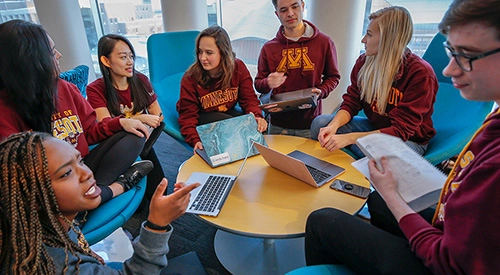An inter-university, interprofessional competition involving students from many different disciplines like the Interprofessional Geriatric Case Competition is no simple feat. Some of the most important individuals who help make it possible are the volunteer coaches and judges who work with the student teams and assess the competitors’ performance.
The Minnesota Northstar Geriatric Workforce Enhancement Program’s geriatric case competition is led by Kris Talley, PhD, APRN, CNP, FGSA, faculty in the School of Nursing at the University of Minnesota. Dr. Talley said, “I can not express how grateful I am for the wonderful contributions of our coaches and judges. This year we reached out to faculty and community experts from many professions to participate. I was so thrilled that about half of the volunteers were community experts, who provided real world guidance to the teams.”
Each role is a vital component of a successful competition. Read on for an understanding of what the generous volunteers do as part of this annual case competition.
The coaches
Coaches are instrumental in the success of the teams. The coaches are available to their teams for approximately one month, providing guidance throughout the care plan development. Part of the coach’s mission is to ensure effective teamwork, communication and collaboration among the team participants. They keep their team on track and help them remain focused while also advising the team members on available resources.
On the logistics side, coaches set up a presentation rehearsal and offer feedback on their team’s care plan presentation if requested. Because coaches come from a variety of disciplines, they bring their unique background and experience to the team’s work—which is invaluable for an interprofessional case competition such as this. One coach said that the "interprofessional collaboration was amazing. It was great to see all the different students come together and work as a team."
Another coach commented on the case and logistics of participation:
“[I appreciated] presenting a relatively average case of an older adult with increasingly complex medical and social needs. This made the case very realistic and applicable to what is currently available. Being able to join online, for coaches, was really helpful with clinical schedules.”
The judges
A great deal of time and consideration go into determining the winners. Each judge reviews four to five presentations and uses a rubric to score each section using the following criteria:
- Team composition and whether the team has clearly defined professional roles and responsibilities
- How a team works together to meet the fictional patient’s care needs
- The relationship between effective teamwork and improved patient safety and health outcomes
- How well the team places the interest of the patient/family at the center of care delivery
- How the team demonstrates effective interprofessional teamwork and communication
- Presentation skills
The judges complete the assessment rubric online and provide pertinent notes to the teams. In addition to providing feedback, judges come up with final scores. Judges must weigh a number of factors including evidence of patient-centered care; how well the care plan incorporates problems, patient/family goals, interventions, and patient/family education; evidence of meeting interprofessional education competencies; how innovative the plan of care is; and how insightful their reflections are in terms of how well the team members worked together.
One judge observed: “The richness of the case allows each discipline to see many roles for themselves, with the high potential that some patient issues could be most effectively addressed with a genuinely interprofessional approach. MN GWEP does a great job constructing these cases each year! They are so well thought out, multifaceted, and timely.”
Listen to the case presentations of the winning teams:
Watch the Saint Louis University team’s winning presentation.
Watch the UMN team’s excellent presentation.
Seeking volunteers for the 2022 case competition
Be on the lookout for calls to participate in next year’s interprofessional geriatric case competition, which should begin going out in August 2022. If you would like to ensure you receive invitations and general MN GWEP news, please sign up for emails.
About the Minnesota Northstar Geriatrics Workforce Enhancement Program (GWEP)
For the competition, this year the expert judges and coaches involved were faculty, plus community experts from over a dozen clinical practices or long-term care facilities and several community partners who offer services to older adults and their families. A goal of the Minnesota Northstar GWEP is to facilitate and strengthen meaningful support and collaboration of key partners in the geriatrics field. The University of Minnesota is joined by partners to provide greater access to community education in aging and dementia, improve geriatrics training in health professions, and transform primary care clinical training and practice sites to provide Age-Friendly care. By offering interprofessional geriatric learning opportunities to students, we are working toward the overall purpose of the Minnesota Northstar GWEP, which is to improve the healthcare and health of older adults across the state of Minnesota. We are very grateful to the expert coaches, judges and students for their engagement!
